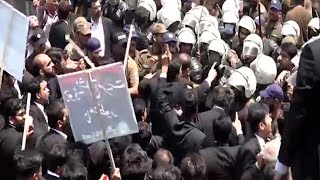LAHORE: No new tax has been imposed by the Punjab government under the sales tax on services for the fiscal year 2022-23. However, the ratio of stamp duty has been increased to two percent from earlier one percent in urban areas in order to increase revenue of the province throughout its resources.
According to the Finance Act 2022 presented at Aiwan-e-Iqbal, where the Punjab government had presented the budget instead of the provincial assembly, tax relief has also been extended to small businesses besides no increase in the existing tax slabs in the province.
Meanwhile, an amendment proposed in the Punjab Motor Vehicles Taxation Act, 1958, includes provisions for imposition of tax in the Schedule to the Act ibid on the electric vehicles proportionate to their power in kilowatts. In this regard, an equation for conversion of kilowatts into engine power in cubic centimeters (cc) has also been devised for determination of power of those electric vehicles that are not specifically included in the said provisions of the Schedule. Despite making proposal for imposition of the said tax, it has been proposed on the analogy of the financial year 2021-22 that 95 percent exemption on such tax shall be given till 30 June 2023. This proposal, among other targets, will facilitate and promote registration of electric vehicles, in turn, leading to a considerable improvement in environment.
The legislative proposal contains provisions for ending the exemption given to student internet package as such exemption has become redundant since no telecommunication service provider is providing student packages anymore while this exemption is no more beneficial for anyone; rather such exemption may help in tax evasion resulting in loss of revenue. Further, it has been clarified that the services of real estate aggregators are included in information technology-based services while the services provided by cab aggregators are included in ride-hailing services.
For ease of doing business, the limit of input tax adjustment is proposed to be increased from 80 percent to 90 of the output tax. A number of provisions regarding limit of input tax adjustment, penalties and time limitation are also part of the legislative proposal seeking amendments in the Act XLII of 2012.
In order to achieve a more progressive taxation, enhanced rates for tax on luxury houses have been introduced for houses above a certain size with the completion of construction date from 01.07.2022.
For purposes of promoting e-payment of urban immovable property tax and motor vehicles tax, a discounted rate of five percent has been proposed as introduced previously. Besides, surcharge and penalty for property tax and motor vehicles tax have also been rationalized by shifting them to the payments made during the last two quarters of the financial year. Provincial Minister Sardar Awais Khan Leghari, who presented the provincial budget, said the government has decided to continue with its policy of reduction in tax burden on poor segments while shifting it to the affluent classes of the society.
He said the fundamental theme behind the tax scheme of the province is to bring rich segment of the society to the tax net while exempting the deserving and low income sections of society. Similarly, a revised e-auction policy has also been introduced in the bill for the auction of attractive numbers of vehicles during the upcoming fiscal year.
Copyright Business Recorder, 2022























Comments
Comments are closed.